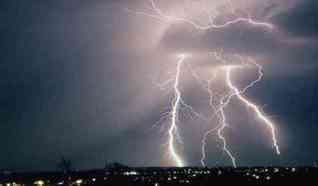LUDOVICO ANTINORI
In the 30?s, only the specialists talked about it. In the 70?s, 10-15% of the population had caught on. Today, meteoropathy is known to 25-30%. In the years to come, the statistics could become even more alarming if it?s true that there?s a close relationship between this syndrome and the two most evident problems of the modern era ? stress and pollution. Until now, this phenomenon has not been taken very seriously, especially by friends and family members of those who are disturbed by changes in the weather. Often, the victims are not paid attention to, or they are said to be exaggerating, or even worse, they are laughed at for their seeming attempts to divine the coming weather. How many times have you heard someone say, ?My knee?s hurting. I bet the weather?s going to change.? And how many times does this phrase bring a smile to the lips of the listener. However, science is showing that there is little to laugh at. Meteoropathy, from the Greek (pathos means suffering), is considered a true illness by the medical community, even if the symptoms are due to external phenomena. Considering that in the past few years, due to the famous hole in the ozone layer, meteorological conditions seem to change more often and excessively, it may be the right time to give more attention to this phenomenon. For its part, medicine is doing what it can.

INTERVIEW WITH DR. ANGELICO BRUGNOLI
We?ve asked an expert to enlighten us. Dr. Angelico Brugnoli is a specialist in climatological medicine at the Institute of Climatological Medicine at the University of Milan, under Prof. Umberto Solimene.
- What is meteoropathy?
- It is a syndrome, that is, a group of symptoms and pathological reactions that manifest when there is a gradual or sudden change in one or more meteorological factors in a given area. By meteorological factors, we mean the air temperature, relative humidity, wind speed, atmospheric pressure, rain and thunderstorms with the typical effects on the air that they have ? ionization, the electrical state and turbulence. These variations can manifest themselves in a brusque manner as cold fronts pass, with thunderstorms or with squalls, or in a gradual way. For example, on Continental Europe, after a period of good weather, when a disturbance from the Atlantic arrives, we can detect various effects on the body manifested in the various organs and systems. And, the phenomenon is more noticeable when more atmospheric factors are involved at the same moment.

- Who suffers from meteoropathy?
- Above all, the neural unstable, that is, those subjects that face life with heightened emotions, at times at unjustified levels, and especially anxious are depressed persons. In other words, those who have disturbances in the neural system. Today, neural instability is on the increase due to the frequency of negative factors in life, such as stress, loss of values, difficulty finding work or the disadvantages of retirement, the continuing competition to get ahead, and, not least, pollution ? both atmospheric and aural. Those subjects who have been diagnosed as neural unstable are often meteoropathic as well.
- Scientifically, how does the organism respond to changes in the weather?
- Usually, around 48-24 hours before the arrival of the weather change, particularly sensitive people, such as those we?ve been speaking about, may have various symptoms which, taken together, make up the meteoropathic syndrome. The most frequent symptoms are an increase in depression, both mental and physical, weakness, hypertension, cephalea, a desire to remain indoors, increased susceptibility to pain in the joints and muscles, difficulty in breathing and a heavy feeling in the stomach. There may also be mood disturbances, irritability and symptoms in the cardiovascular system, such as palpitations, cardiopalpus, or pain in the sternum.

- How long do the symptoms last?
- One or two days. They begin to decrease once the weather has changed, but return if the weather changes again. When the changes follow one after another, the symptoms decrease in intensity each time, as a sort of adapting process occurs. Naturally, even if the changes are different, a hot front (in winter), a cold front (in summer), the symptoms are more or less the same. It should be considered, however, that weather doesn?t only change on the ground, it changes at high altitudes, as well. At the Institute of Climatological Medicine of Milan, we have already been studying weather changes as high up as 500hpa (around 5500 meters) for some years, which have been overlooked, until now. The so-called drops of cold air high up can last, for example above the Mediterranean basin, for 7-10 days consecutively. These have a great effect on the weather at lower altitudes, causing thunderstorms, heavy showers and strong gusts of wind, which the human organism can react to for a longer period than the normal 48-24 hours ? sometimes as long as a week. On the other hand, when a bubble of hot air forms at high altitudes, for example, a summer anticyclone that creates a high-pressure zone, it can last 15-20 days. In August 1998, the hot air bubble lasted for around a month, and caused, as we witnessed, notable damage to the human organism.

- What can happen in these situations?
- One can experience the so-called hot flash (not to be confused with sunstroke!), which usually happens in the presence very high relative humidity and high temperature, usually over 35°C, with no wind. In these conditions, the organism heats up, especially when one drinks very little. This can also happen in lower temperatures if one stays out in the sun for a long time. If the relativity humidity is low, it is even worse, because the sky is very clear, and the solar radiation is particularly intense, so much so that neither the sun?s ultraviolet rays (because of the hole in the ozone layer) nor the infrared rays are filtered.
- Is there anything that one can do to prevent meteoropathy?
- There is some encouragement. First of all, I personally handle a weather report specifically for meteoropaths, which is transmitted by a television station. It is a useful service, though still in an experimental phase in Italy, while it is working perfectly in Germany, Switzerland, Austria, Hungary, Czechoslovakia and Slovenia. Based on meteorological study, it consists of forecasting weather conditions that may occur on a certain day, the idea being prevention by taking certain medicines. In any case, in Italy, when one sees changing weather conditions in Spain or in France, one should start the therapy immediately.
- What does the therapy consist of?
- We advise to take, 48 to 24 hours before the arrival of a change in weather, an antiallergenic and a vegetable based sedative, like hawthorn, linden, or valerian (never benzoidiasepine!). This is because meteoropaths, like neural unstable subjects, often suffer allergies, especially from smog. Unfortunately, allergies are on the increase due to the increasing atmospheric pllution. Another form of prevention is to cure the cause ? that is, the depression of neural instability. An international study also showed that living in a well lighted ambient, with strong lamps, helps to beat that part of depression that influences meteoropathy, and vice-versa. Above all, at the end of winter, those in a well lighted ambient suffer much less the so-called ?spring depression?, that is, the change from one season to another.

- Can perfectly healthy people suffer from meteoropathy?
- Yes, but with much less obvious symptoms. We call them neural stable, and therefore, meteorostable. There is a borderline case, which is not very evident.
- Can one be an episodic meteoropath, and suffer attacks rarely?
- Subjects develop meteoropathy in their fifties, usually. At that age, the defenses of the organism begin to slow down, and stress increases.
- Is there a particular therapy for senior citizens?
- For subjects over 60, the most effective preventative medicine is to take an antiallergenic (better in the evening because they can cause drowsiness and therefore can act as a mild sedative) with a non-steroid anti-inflammatory, which increases tolerance for pain. Don?t ever take cortisone, as it diminishes the immune system.
- Is meteoropathy a genetic condition?
- No. However, since it depends on neural instability, which is transmitted in the genes, one could pass on a predisposition for the condition.
- Does it help to stay indoors?
- The closed environment, which we call a confined micro-climate, is more damaging than others. Today, we know how many viruses and bacteria live in closed environments. Therefore, it?s better to get out, though city dwellers will have to take in account the pollution.




